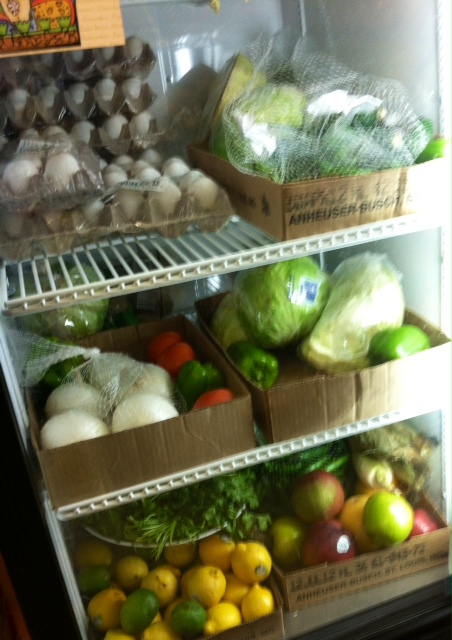Share On Social!
Jalapenos, cilantro, garlic—“The Mexican culture cooks a lot of vegetables in meals and everything has to be hot,” said Sandra Gonzales.
Sandra and her brother, Rudy Gonzales, made sure to stock those good-for-cooking-spicy-meals vegetables in the Nuevo Leon Meat Market in San Antonio’s predominantly Latino Westside, which Rudy has owned and operated for nearly a decade.
But they had no other healthy choices—snacks like apples, bananas, or grapes—in an area that sorely lacks healthy food options.
With a little help from the city and a big decision by Sandra and Rudy, the neighborhood that depends on Nuevo Leon for cooking essentials is now able to pick up fresh, healthier snacks.
Food Options at a Meat Market
On San Antonio’s Westside, a predominantly Latino community, there are lots of fast-food restaurants and not many options for fresh fruits and vegetables, and it shows: two-thirds of residents in this area are overweight or obese.
One local corner store, Nuevo Leon Meat Market, weren’t offering fresh produce.
Instead, the only snack foods it offered were chips, cookies, pastries, and candy. The store did sell a few vegetables, such as jalapenos and garlic used for cooking, but lacked any fresh snack options.
“I’m trying to lose weight and eat more vegetables myself,” said Rudy Gonzales, owner of Nuevo Leon Meat Market. “So I was looking for an opportunity to help my community eat healthier, and I thought my store could start making a difference.”
Gonzales was excited when he got a call from the City of San Antonio.
The city informed him that, in 2011, the San Antonio Metropolitan Health District created an initiative, called Tiendita Por Vida, to put small produce coolers and freezers into two corner stores on the city’s Westside for owners to stock with fresh fruits and vegetables and frozen vegetables hoping to infuse the area with healthier food choices.
The produce coolers were a hit; in addition to typical fare like apples and bananas, customers bought sweet potatoes, eggplants, and even brussel sprouts. Both pilot stores made enough money and had enough community support to continue selling fresh fruits and vegetables in the coolers.
Now Metro Health wanted to bring coolers to more corner stores in the Westside—and that included Nuevo Leon Meat Market. The store already had a cooler to store cooking vegetables, like cilantro, but it was in the far back of the store and in bad shape.
“We heard about it and we made a call,” Gonzales said.
He decided this was a great way to improve local health, so he filled out the application. Even though Gonzales would have to pay for the new fruits and vegetables himself, he was willing to take a risk to benefit the neighborhood.
A Freezer for Healthy Food Options
With the Gonzales family on board, the city in 2012 started a one-year trial period with Nuevo Leon Meat Market by installing a fresh produce cooler in the center of the store, easily visible to customers. The Tiendita Por Vida logo, signaling to consumers that the cooler contains only healthy options, is highly visible on the cooler.
Once installed, the city held a cooking demo at Nuevo Leon so the community could come see what sorts of dishes they could prepare with the new items like cauliflower and mangos. Metro Health also provided the store with recipe cards to pass out to customers with quick, easy, and healthy recipes for meals like chicken and vegetables.
People in the community don’t want to spend time going to the big grocery stores that are too far away, said Sandra Gonzales: “They would rather stop by somewhere close to home, like Nuevo Leon. They come in and buy everything they need.” And now, that includes healthy snacks.
Metro Health officials sought to be sure that the coolers would be used only for healthy snacks at least for the first year.
The Gonzales thus agreed to a one-year memorandum of understanding (MOU) with the city stating that the cooler would only be stocked with fresh fruits and vegetables, not stuff like ice cream or soda. After the one-year trial period ended, stores could decide to do what they pleased. The city hoped that after the trial period, Nuevo Leon wouldn’t see a need to add unhealthy items into the cooler.
Selling the Healthy Items
The store conducted another cooking demo later in the year to remind customers and neighborhood residents about the new healthy offerings. Sandra says she noticed more people stopping by the store and grabbing things from the cooler; a lemon, a bell pepper, a mango.

Source: Shannon Baldwin
To feel good about keeping the cooler stocked with fresh produce after the city’s support would run out after the trial first year, Gonzales said he needed to see an increase in sales, or at least not a decrease.
At the end of that first year, Gonzales was making $60-80 a month in profit from the new produce. Besides making money, the store was also seeing more customers overall.
“They had more traffic coming in to get the produce, so that’s nice” said Jeremy Beer of Metro Health.
The initial trial year and city support came to an end in early 2013.
The extra money, more traffic, and overall positive community response for the new healthier offerings was enough to convince Gonzales to continue offering fresh fruits and vegetables for good.
So, as part of his normal management of the store, he installed a new operational routine of budgeting money to buy fruits and vegetables every week to keep the cooler stocked.
Healthy Food Now a Staple
Bananas, apples, and mangos are now everyday items at Nuevo Leon, which a few years ago moved from its old location on North Zarzamora Street to Bandera Road.
Sales are still going well, Gonzales said. When people stop by to grab dinner ingredients, they sometimes leave with something new, too, like an avocado.
The store continues to fine-tune its offerings.
Because fresh produce tends to spoil faster than packaged foods, some of the new food options ended up going to waste, so the Gonzales siblings have to carefully weigh customer demand and cost, buying less of what isn’t selling and more of what is.
Going forward, the Gonzales’s will want to frequently reexamine their pricing strategies to make sure that selling fresh fruits and vegetables remains profitable for them.
“I know they want to make it affordable to the community, but they have to make a profit,” Beer said.
He suggests that a small corner store like Nuevo Leon might benefit from having someone from a larger store offer pricing advice and tips.
Another helpful resource is the Sell Healthy! Guide from The Food Trust, a group that tackles food access issues. The guide is an extremely helpful resource that teaches small corner store owners how to price, sell, and promote healthy foods in their stores; this would be an excellent guide for people like Rudy and Sandra.
They would encourage other corner store owners who don’t offer healthy snacks to give it a try.
At Nuevo Leon, Sandra and Rudy strongly believe having easy access to fresh fruits and vegetables is important to the health of every community. They take pride in offering healthy options in their store, “and it’s good for business,” Rudy says.
By The Numbers
1
Supermarket
for every Latino neighborhood, compared to 3 for every non-Latino neighborhood
This success story was produced by Salud America! with support from the Robert Wood Johnson Foundation.
The stories are intended for educational and informative purposes. References to specific policymakers, individuals, schools, policies, or companies have been included solely to advance these purposes and do not constitute an endorsement, sponsorship, or recommendation. Stories are based on and told by real community members and are the opinions and views of the individuals whose stories are told. Organization and activities described were not supported by Salud America! or the Robert Wood Johnson Foundation and do not necessarily represent the views of Salud America! or the Robert Wood Johnson Foundation.



